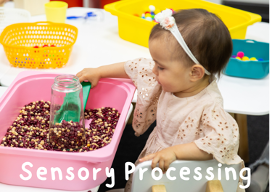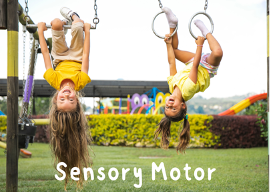

Sensory Processing Disorder
Sensory is more than just touch, taste, smell, sound and sight. Sensory processing allows to take in all sensory input, interpret it and respond to it. Everything we do requires our sensory systems, feeling, moving, eating, talking and it impacts even how we behave. We grow and learn and our bodies develop based on the sensory information we receive.
Sensory Processing Disorder (SPD), also known as Sensory Integration Dysfunction, is a neurological condition that affects the way an individual processes and responds to sensory information from the environment. It occurs when we cannot properly process, register or modulate the sensations in our environment or body and it can lead to a variety of behaviors and challenges in daily activities and social interactions.
Common Terms
- Sensory-Based Motor Disorder:
- This aspect of SPD involves challenges in coordinating and executing motor tasks that are based on sensory input. Difficulties may include poor motor planning, coordination issues, and challenges in activities that require a precise response to sensory cues.
- Sensory Discrimination Disorder:
- These individuals have a hard time accurately interpreting and distinguishing sensory stimuli
- Sensory Modulation:
- Sensory modulation refers to the regulation of the intensity, frequency, and duration of responses to sensory stimuli.
- Sensory Over-Responsivity:
- Heightened sensitivity resulting in large meltdowns, overreactions or avoiding behaviors to certain stimuli
- Sensory Under-Responsivity:
- Decreased or diminished reaction to stimuli resulting in constant seeking behaviors or increased lethargy
Symptoms of sensory processing disorder or difficulties may be:
- Avoidance of certain clothing, tags or socks
- Avoidance of touch from others
- Constant movement, unable to sit still
- Difficulty handling crowds
- Leaning or propping self on items or people
- Picky eating
- Tantrums or overactivity
- Sensitivity to sound
- Uncoordinated movement, appears clumsy